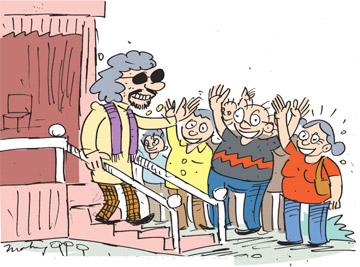|

by R. S. Karunaratne
Relative clauses with ‘who’
A relative clause describes a noun in the main clause. We use a
relative clause beginning with ‘who’ to describe a person or people.
The professor likes students who study English literature.
In the above sentence, “The professor like students” is the main
clause. “Who study English” is the relative clause. In the following
sentences, the relative clauses appear in bold type.
|

Fans waved at their popular actor who was coming down the
stage. |
I visited my class teacher who retired recently.
Charles Dickens was the author who wrote Great Expectations.
Shane is one of the students who have failed the examination.
Fans waved at their popular actor who was coming down the stage.
Watson is a doctor who does not do private practice.
A relative clause should have a subject and a finite verb. The verb
should agree with the subject.
Diogenes was a Greek philosopher who lived a simple life.
Here “a Greek philosopher” is the noun described. “Who” is the
subject of the relative clause. “Lived” is the finite verb of the
relative clause.
More examples:
Margaret is one of the teachers who encourage me to learn English.
The police commended the informant who reported the crime.
Many people avoid colleagues who gossip about others.
The tents are for the families who lost their houses.
He rescued the child who was about to drown.
Instead of being the subject of a relative clause, “who” can be used
as the object of the finite verb in the clause.
Anna is the singer who my friends admire.
Traditionally, “who” is used as the subject and “whom” as the object.
In modern English, however, it is more common to use “who” as the
subject and object.
He was the commander who the soldiers respected most.
A defining relative clause with “who” identifies the person or people we
are referring to.
I ran into my friend, who got a promotion recently.
Here we are referring to a particular friend who got a promotion
recently, not anybody else.
On the other hand, a non-defining relative clause with “who” does not
identify the person or people we are referring to. We always put a comma
before a non-defining relative clause.
|

He rescued the child who was about to drown. |
I ran into my friend who gave me a lift home.
[Activity]
Rearrange the jumbled words and check your answers with the key.
1. I / think / was / dad / your / phoned / who / it.
.............................................
2. attention / of / centre / be / the / Nethra / one / is / those /
of / girls / love / who / to.
.....................................................
3. about / told / you / I / who / Chandu / , / is / this.
........................................................
4. octogenarian / an / is / who / grandfather / I / jog / my / with.
........................................................
5. the / principal / the / warned / fighting / were / who / students.
.........................................................
6. music / in / excelled / Amanda / one / is / the / of / girls /
who.
.........................................................
7. recommended / he / the / is / lawyer / my / who / neighbour.
..........................................................
8. welcome / feel / I / like / friend / your / , / who / me / makes.
..........................................................
9. homework / their / the / likes / teacher / those / do / who.
..........................................................
10. Jaffna / come / from / has / we / who / have / new / a /
colleague.
..........................................................
Key:
1. I think it was your dad who phoned.
2. Nethra is one of those girls who love to be the centre of attention.
3. This is Chandu, who I told you about.
4. I jog with my grandfather who is an octogenarian.
5. The principal warned the students who were fighting.
6. Amanda is one of the girls who excelled in music.
7. He is the lawyer who my neighbour recommended.
8. I like your friend, who makes me feel welcome.
9. The teacher likes those who do their homework.
10. We have a new colleague who has come from Jaffna.
Quiz on circumlocution
Circumlocution employs long words, often incorrectly or
inappropriately. To avoid being accused of circumlocution, stick to the
point! Replace the words in bold type with suitable words. Check your
answers with the key.
1. In the event that the Railway employees strike tomorrow, we will
have go by bus. .............
2. I’ll buy a car in the near future. ..............
3. I met him in the recent past. ..............
4. The elephant is an animal large in size. .............
5. In my opinion, he is a dishonest person. .................
6. The rose is pink in colour. ..............
7. Prior to meeting the king, the ambassador will speak to the minister.
..............
8. Can you provide a contribution to this worthy cause? .............
9. There can be little doubt that he will win the election. ............
10. There is a possibility that you will pass the examination.
...............
11. To the best of my knowledge and belief, he will be an asset to your
company. ...........
12. Most students attend tuition classes with a view to passing the
examination. ................
13. With the exception of John, everybody took part in the contest.
..........
14. Regardless of the fact that Prem is hard of hearing, he is a good
dancer. ..............
15. Subsequent to his appointment as a director, the company gave him a
car. ...............
Key:
If 2. soon 3. recently 4. a large animal 5. I think 6. The rose is
pink 7. Before 8. contribute to 9. No doubt 10. Possibly 11. I believe
12. to pass 13. Except 14. Although 15. After
Starters:
How to use prepositions
Part 15:
There are over 100 prepositions in English. This is a very small
number compared with the vast number of nouns, verbs and adjectives used
in English. However, beginners find it difficult to use prepositions
correctly, Here’s a guide.
Irrespective of
|

The stranger looked like a burglar. |
If something is true irrespective of a particular factor, that factor
does not affect the situation.
Those found guilty of malpractices should be punished irrespective of
their rank or position.
Laws must be applied irrespective of a person’s ethnic origin.
Like
If somebody or something is like another person or thing, they have
similar characteristics.
The stranger looked like a burglar.
I don’t criticise others, I’m not like you.
I would love to live in a house like yours.
We use ‘like’ when giving an example of the kind of thing we have just
mentioned.
In crowded cities like Delhi and Colombo the air is polluted.
‘Like’ is used to mean ‘in a way that suggests.’
It looks like I’m going to be doing this job for ever!
You look like you’ve got out of the swimming pool!
“Like” can mean “such as.”
Imelda looks best in vibrant colours like red and pink.
Minus
“Minus” means “reduced by a stated number.”
What is 72 minus 36?
In informal English we use “minus” to mean “lacking” or “without.”
We are minus a chair for the meeting.
The one-man commission prepared a report minus any details that could
jeopardise national security.
Near
We use “near” to mean “not far away in distance.”
Is there a bank near here?
May I sit near the stage?
Don’t come near me, I have a bad cold!
My house is near the public park.
I couldn’t stand near enough to hear what they were discussing.
“Near” can mean “not far away in time.”
As the date of the examination drew near, I became nervous.
Note: “Near” has the comparative form “nearer” and the superlative
form “nearesr.”
Next to
If somebody is “next to” another, they are at the side of the other.
Nellie sat down next to Julia.
If something is “next to” another, they are at the side of the other.
My office is next to Silva’s.
Notwithstanding
“Notwithstanding” means “despite the fact or thing mentioned.”
Notwithstanding the objections of the shanty dwellers, the local
authorities demolished the shanties.
[Activity]
Fill in the blanks with the correct prepositions given in brackets.
Check your answers with the key.
1. Eva arrived early ........... school one day. (at / in)
2. The writer is privileged .......... write whatever he chooses. (for /
to)
3. My uncle returned ............ working overseas. (from / for)
4. Everyone felt sorry ............ her . (on / for)
5. I told him my problem and asked ........... advice. (on / for)
6. It is sad to note a decline ........... the moral standards among the
young. (in / about)
7. Some teachers do not have a passion ....... education. (to / for)
8. Some people prefer darkness ........... light. (to / than)
9. I enjoy sitting in wooded areas .......... night. (in / at)
10. Chitra’s steps broke .............. a run and she headed towards the
shop. (into / to)
Key:
at 2. to 3. from 4. for 5. for 6. in 7. for 8. to 9. at 10. into
Adjectives from nouns
Words often come in families. You can expand your vocabulary by
becoming familiar with these word families.
In the following quiz we give a list of nouns in Column A.
Fill in Column B with the relevant adjectives.
The first one has been done for you. Check your answers with the key.
Column A Column B
1. Formality formal
2. Fortune ..............
3. Freedom ..............
4. Freeze ..............
5. Frequency ..............
6. Freshness ..............
7. Friend ..............
8. Fright ..............
9. Fruit ..............
10. Fund ..............
11. Furniture ..............
12. Generalization ..............
13. Generosity ..............
14. Gentleness ..............
15. Gladness ..............
16. Glass ..............
17. Goodness ..............
18. Government ..............
19. Gratitude ..............
20. Greatness ..............
21. Greenery ..............
22. Ground ..............
23. Growth ..............
24. Guilt ..............
25. Habit ..............
Key:
2. fortunate 3. free 4. frozen 5. frequent 6. fresh 7. friendly 8.
frightened 9. fruitful 10. funded 11. furnished 12. general 13. generous
14. gentle 15. glad 16. glassy 17. good 18. governmental 19. grateful
20. great 21. green 22. groundless 23. grown 24. guilty 25. habitual |


